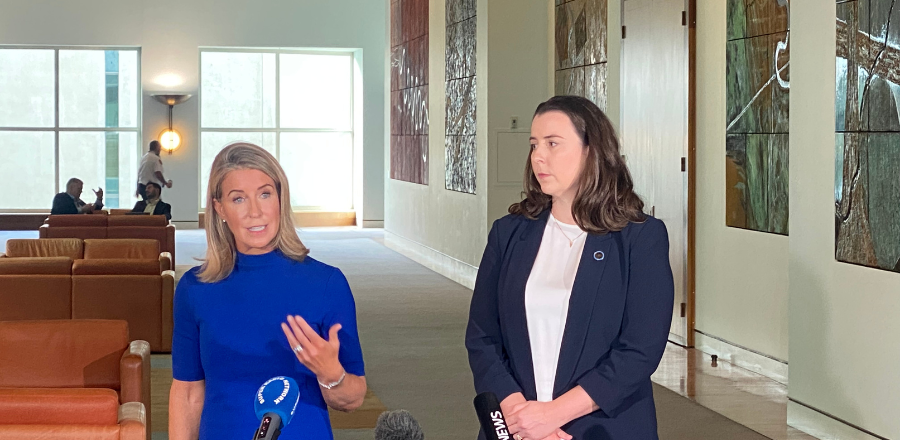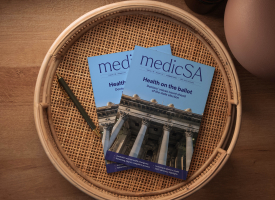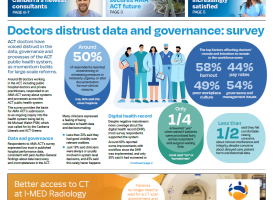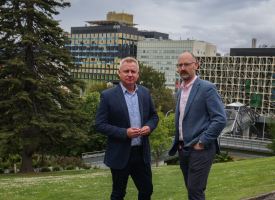AMA Transcript: Public Hospital Report Card and vaping
Friday, 19 April 2024

Transcript: AMA Vice President, Dr Danielle McMullen and AMA Emergency Medicine Representative Dr Sarah Whitelaw, Parliament House Press Conference , Friday, 19 April 2024
Subject: AMA Public Hospital Report Card
DANIELLE MCMULLEN: I'm here today with my colleague, Dr Sarah Whitelaw, to launch the AMA's 2024 public hospital report card. Now, it will be no surprise to many that our hospitals are in crisis. The percentage of our patients in Australia in emergency departments being seen on time is the longest it's been in 10 years, with more than three in 10 of our sickest patients, people with heart attacks and strokes not being seen within the 10-minute recommended wait time.
But it’s not just our emergency departments in crisis. Our planned surgery wait times are the longest on record. That means that we're seeing patients waiting in pain with disability, unable to work or participate in their family lives because they're waiting too long for these essential surgeries. As a GP, I see that in my clinic. I've got patients waiting for hip surgery, knee surgery, back surgery and plenty of other conditions where they're waiting in pain and we're having to manage those symptoms in general practice when really the treatment they need is a planned surgical admission.
Government has recognised that our hospitals need more funding, and the Commonwealth has committed to a significant increase in public hospital funding from 2025. But we can't wait that long. At the AMA, we are calling on state and Commonwealth governments to share an injection of $4.1 billion to clear the backlog and make sure that Australians across our country are able to get the care and the time that they need.
SARAH WHITELAW: This public hospital report card is pretty devastating. We're seeing a worsening in almost all of the parameters that we've been tracking since 2007. Not only are we at the point where our median waits for Cat 2 surgery are the longest now that they've ever been, we're also seeing the smallest number of patients having their surgery performed on time. In our emergency departments, the report card reflects what we're seeing every day on the ground. We're seeing that our wait times for patients to get emergency care are longer than they've been in the last ten years. We're also seeing that our hospital logjam is worsening and unfortunately, patients spending time in the emergency department before they can access hospital beds has also increased to the longest times in the last 10 years.
What does this mean for us on the ground? What does this mean for our patients? It means that we are seeing elderly patients sitting in plastic chairs for hours. We are seeing patients getting intravenous fluids and antibiotics in waiting rooms. We are resuscitating people in corridors. We are breaking traumatic, incredibly stressful news to people who have no privacy, who are often in corridors surrounded by lots of people that aren't their family and loved ones. We are seeing patients die in emergency departments when we know they should be in a much better environment, surrounded by their family and friends.
Staff are having to watch patients not get the excellent emergency care that we know that we can deliver and have worse outcomes as a result. We know that this is creating such a vicious cycle. When you have patients waiting so long for elective surgery, not only can they not work - and we think about 20 per cent of those people waiting on a planned surgical waiting list are not able to work - it puts strain on their carers, it increases incidents of mental health problems. These people are in pain. And actually, they are developing emergency complications of waiting too long with these conditions. That means they're having to present to emergency departments, they're needing hospital admissions and in some cases needing emergency surgery.
This is costing us more, and it's making that vicious cycle worse. Every day, hospitals play Tetris trying to find every single available bed and every single available staff member to admit patients from the emergency departments and to assess what patients they are going to need to cancel from elective surgical lists. Every day we fail, and we leave patients in emergency departments for much longer than we should. We know that this increases morbidity and mortality and actually increases hospital length of stay. We know also that then decrease the amount of elective surgery we can do, and the waiting list gets longer.
So we are in this vicious cycle unless we do something to stem the bleeding before the NHRA agreement ends, we are going to be in a situation where it's actually going to cost us more. And it really is a scenario where we can't afford not to make the emergency investment that we need. So this $4.12 billion over two years to address the elective surgical waiting lists along the lines of the complex plan that we've developed in consultation with an enormous number of stakeholders, we know there are solutions. And that needs to be a shared funding agreement between Commonwealth and state and territory governments.
There is a perfect opportunity this afternoon for the health ministers to work together to overcome that barrier for patients who don't care, frankly, whether their care is the responsibility of the state government or the Federal Government. They just want governments to work together and come up with an emergency plan for what we do right now. It is terrific that the Federal Government has recognised the depths of the crisis we're in and committed to that increased NHRA agreement funding, which we start in 2025. But we can't wait till then. We can't wait, as staff in our emergency departments and our public hospitals in primary care and community care, we can't wait as Australians in the community.
QUESTION: Just on the report, with the elective surgery waiting times, what factors do you believe specifically have led to such an increase of nine days in just one year, the biggest one outside of COVID? And the fact that the wait time or the median wait time has almost doubled in the last 20 years.
DANIELLE MCMULLEN: There are obviously a number of factors that contribute to an increased elective surgery waitlist or planned surgery waitlist. While we have seen the raw investment in health and in public hospitals increased over years, that hasn't kept pace with the increased complexity of illness. We're seeing an ageing population and so that means with more older Australians, with more chronic disease and more complex disease, the medical care that they require isn't as easy or as simple as it may have been 20 years ago. And so we have seen the complexity of surgery cost more and is slower to deliver and proven to be slower to deliver over that time.
There was some catch up work done due after the COVID-19 pandemic but as our report shows, we've immediately erased that catch up work that we didand we've seen an enormous increase in the wait time this year. And it just shows how under strain our hospitals are through a combination of inadequate funding, workforce constraints and that complexity of illness that we see.
QUESTION: On factors there, well, what about how much is this reflective of people's time away from private health cover for example, more people going to public hospitals instead? Is that part of the problem?
DANIELLE MCMULLEN: So we've actually seen across Australia, some modest increases in private health insurance uptake. During the pandemic, we did see more people take up their private insurance. And in Australia, we do rely on that balance between public and private care. And it is really essential that we have reforms and continue to improve our private hospital sector to ensure that remains value for money and as valuable contribution to our health care environment. But we do, of course, also see strains on the public system. Despite some increase in work in the private sector, we're still seeing the pressure on the public as well.
QUESTION: And on a state level, what stood out to you most from this report card? What is most shocking?
SARAH WHITELAW: What stood out to me most is how much this is a national problem. And it isn't a state that is doing much better on all parameters and there isn't a state that's doing terribly on all parameters compared to other states and territories. This is a problem that no one can be complacent about, no matter where they live in Australia. It is across metro, it's across regional and rural Australia, and it is really across every single state and territory. So it needs that collaborative approach and that combined approach of all of the health ministers, including the Federal Government, to address. There isn't a place in Australia where you sit back and be comforted by what's in this report.
QUESTION: And how confident are you that extra $4 billion could be included in next month's budget?
DANIELLE MCMULLEN: The Commonwealth Government has recognised that there is a problem that needs to be fixed and the logjam needs to be addressed. The timing of that funding not coming in until the new reform agreement is what concerns us. Given that they recognise there's a problem, we are hopeful that they will work to a solution. And the urgency of that solution is announcements in this budget, and it will take the work of all health ministers. So we are encouraging them to talk about it today and make sure that they come up with that emergency plan to rescue our public hospital system.
QUESTION: And just one more on a separate topic if I can, health ministers have this morning declared their support for action on vaping. Do you think that the health system has the capacity to deal with e-cigarettes as a therapeutic good?
DANIELLE MCMULLEN: Yeah, as a GP, treating patients with addiction or substance use problems or really general concerns about their health and their habits is the bread and butter of our work. And GPs are ready and prepared to have these conversations with our patients. We would much rather see people to discuss their smoking and vaping, than to see them with the health consequences of that vaping in five, 10, 20 years' time.
QUESTION: What's your message to some of the parties that haven't come out with a position on vaping products yet? And what would you say about the approaches where we could see regulated vapes instead of just therapeutic vapes available through pharmacies?
DANIELLE MCMULLEN: We've written to all Senators and all parties to encourage them to support the legislative amendments that are put forward at the moment. We need to get vapes out of the hands of our children and young people. I have seen firsthand the harms they cause. I've had children in my clinic who are up in the middle of the night vaping. They can't sleep through the night because of the level of nicotine addiction that they have, and that is heartbreaking. So, we have shared those stories and implored all parties to support the legislative change. With regards to regulation of vapes, we know the harmful effects of smoking. If we knew back then what we know now about smoking, we wouldn't have those products on the shelf either. And we've got an opportunity now to protect the health of the next generation of Australians. We can't afford to let that opportunity go.
QUESTION: Back on the report, I know regional and rural have a shortage of GPs. Does that burden then the public health system in those areas?
SARAH WHITELAW: There is absolutely no doubt that underinvestment and under-resourcing of general practice means that we miss opportunity after opportunity to stop people getting so unwell that they need hospital admission and they need emergency department care.
Most of our patients are not GP patients. Most of our patients, particularly the patients that are ramped in ambulance corridors and are stuck in our emergency departments, are really sick and they need hospital admission. They are not patients that are coming into our emergency departments because they can't get access to general practitioners. But without resourcing and investment in general practice, again, we miss the opportunity to prevent people getting that sick in the first place, which is absolutely where we need to focus our investment and our resourcing. It is the most valuable bang for the buck that we can get. We don't want to have to keep expanding our acute care system because of our lack of investment and resourcing of GPs.
So yes, that has an effect, but it doesn't have the acute effect in what we're dealing with in emergency departments right now in terms of overcrowding and the increasing morbidity and mortality associated with people staying in emergency departments for too long. Those aren't GP patients.
About the capacity of the health system to deal with prescription requirements for vaping. What this report card shows us is that our health system does not have the capacity to deal with the long-term health impacts of vaping in our society. So, if we- it is absolutely crucial that we do something about vaping right now, because putting the long term health effects that we've seen in cigarettes from vaping on the burden- or adding to the burden of our health system in general, it's something that we need to avoid at all cost.
QUESTION: This report obviously shows that there's issues with the health system capacity wise. So we're talking staffing. So, funding aside, from a practical point of view, where do we find those extra staff?
SARAH WHITELAW: We need to start with keeping the staff that we've got in the system, in the system. So, really retention needs to be our biggest focus. And when we look overseas at one in seven health professionals in the UK looking at leaving the NHS, we know how important it is for us to retain the staff that we've got, and that takes investment and that takes resourcing, and we know what's required there. So it's about that listening and that understanding of what we need to retain staff in the system. And then- I'll hand over to Dani to talk about the need for increased resourcing within general practice to again sustain the general practice workforce.
DANIELLE MCMULLEN: We do need to keep the staff that we've got, but we also need a national plan to work out how many staff we need. And that's across both our medical but also our nursing and allied health workforces. We need to know how many people we need and where we need them, and what jobs we need them to do. And so we have for some time been calling on government to establish a robust national workforce body that has teeth to be able to make sure that we can create the plans, but also implement them. For this short term funding request, we have heard time and time again from hospitals on the ground that they do have staff that have ideas and strategies to get through the waitlists that they have. With some flexible short term funding, we are confident that there are localised solutions that can get the work done with the staff we have today. They just need the support and the flexibility to be able to do it.
QUESTION: Just back on the report, you mentioned before about Australia's ageing population, kind of a contributing factor to the increase in elective surgery waiting times. Obviously, that isn't going to be ending anytime soon. So obviously as the population ages even further, do you expect the wait times to increase even more so, like, as the ageing population ages more?
SARAH WHITELAW: What you're saying is in terms of our ageing demographic and our patients with more complex chronic illnesses, is reflected in the report. What we're seeing through the emergency department is sicker patients, and higher proportions of sicker patients that need emergency care and need hospital admission. So, I think what you're describing there, in terms of that ageing population combined with a decrease in the number of beds for our over 65 population that are increasingly needing that care, without that understanding and that investment and that strategic planning to deal with that. Absolutely. We will see a greater strain on the health system.
DANIELLE MCMULLEN: That's why we're worried. We see the changing demographic. We can see that our population is ageing out, illness is getting more complex and chronic. To address that, we need a coordinated health care system that keeps people weller for longer, that's investing in general practice and primary care to keep people out of hospital. But we recognise that there will still be a number of people who need hospital admissions, and we need that system to be well coordinated, well-funded to make sure Australians get the care they need in the right place at the right time and as much preventative care as possible.
SARAH WHITELAW: We want to treat the whole patient, and we want to be able to integrate our care from preventative care through general practice and community care to the acute care system, and then out the other side. We need to remove all of those barriers that exist currently, and to fund hospitals and to fund community care, to develop those integrated models of care. That's what we want to do as staff, and that's what our patients want. So now we just need the health ministers to listen to us.



